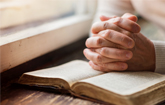National Museum Of American Jewish History Announces Loan Of Original George Washington Letter To Jews Of Newport From Morris Morgenstern Foundation
MOST SIGNIFICANT DOCUMENT IN JEWISH AMERICAN HISTORY TO BE HIGHLIGHTED IN EXHIBIT EXPLORING ROOTS OF RELIGIOUS LIBERTY IN U.S.: TO BIGOTRY NO SANCTION: GEORGE WASHINGTON AND RELIGIOUS FREEDOM
June 29 – September 30, 2012
PHILADELPHIA, May 21, 2012 /PRNewswire-USNewswire/ -- Next to the Declaration of Independence and the Constitution, it may be the most important 337 words in American history, and beginning next month, it will be on public display for the first time in decades – right here in America's birthplace.
With immense gratitude to the Morris Morgenstern Foundation, the National Museum of American Jewish History announces the confirmation of a loan to the Museum of the original letter written by George Washington to the Hebrew Congregation in Newport, Rhode Island in August 1790. The letter, together with such documents as Washington's letter to the Quaker community, correspondence with the Jewish communities of several cities, the Manuscript prayer, known as "The Richmond Prayer," and a portrait of George Washington by Gilbert Charles Stuart, ca. 1800, on loan from the Philadelphia Museum of Art, will form the heart of a new exhibit exploring the roots of religious freedom in America: TO BIGOTRY NO SANCTION: George Washington and Religious Freedom, set to open to the public in time for the July 4 Independence Day celebrations.
"I cannot express the thrill, honor and gratitude I feel, as does everyone connected to the Museum, that we will be the custodians of this remarkable piece of American – and American Jewish – history," said Ivy L. Barsky, Museum Director and incoming CEO. "These artifacts, and this exhibition, enable us to broaden our reach as an institution far beyond the Jewish community -- to be a destination for showcasing history that is profoundly relevant and resonant to all Americans and all visitors to Philadelphia."
Arguably the single most important document in American Jewish history, Washington's letter to the Newport Jewish community represents a courageous and historic statement by America's first national leader, one which both affirmed rights and privileges generally unknown to Jews for millennia and even more importantly, underscored the new nation's commitment to religious liberty and equality for people of all faiths. His iconic address to "the children of the stock of Abraham" emphasized the ideals enshrined in America's founding documents and confirmed the new President's commitment to a government that "gives to bigotry no sanction, to persecution no assistance." Composed in response to a letter from the Jewish community of Newport and on the heels of his 1790 visit to Rhode Island, he pledged to uphold the Constitution's offer of "the invaluable rights of free citizens" to Americans of all faiths and that Jews living in the United States would enjoy "the exercise of their inherent natural rights."
Stated Richard Morgenstern, president of the Morgenstern Foundation, the owner of the document, "We look forward to making history together! It is our fervent hope that unprecedented numbers of people, Jews and Gentiles alike, will be afforded the opportunity to see this document at your institution, and think about the message embodied therein. If they can appreciate and heed its spirit, the world will be better for it."
Kept for the past decade in an arts storage facility in suburban Maryland by the Ventura, California-based foundation, after having been on loan to the B'nai B'rith International Klutznick Museum in Washington, D.C., which closed in 2002, it was the passion and commitment of Jewish Forward reporter Paul Berger and editor Jane Eisner that brought the letter to the forefront of public attention through articles and editorials, and Richard Morgenstern's generosity and belief in the Museum's mission and vision that brought it into the spotlight as the centerpiece of this exhibition.
The Newport correspondence stands as the most enduring, but not the only, exchange between Jews and George Washington. The President also received and responded to letters from the Jews of Savannah and the Jewish communities of Philadelphia, New York, Charleston, and Richmond, which are included in this exhibition.
Nor were Jews alone in their outreach to the new president. Washington's inauguration as America's first president prompted letters of congratulation from numerous American communities of faith, who, like the Jews, envisioned their new leader as a symbol of freedom and independence and hoped to ensure the liberties of worship they believed came with those values. Examples of this remarkable moment in United States history are illustrated by letters from Washington to America's Roman Catholic, Lutheran, and Quaker communities.
At the same time that TO BIGOTRY NO SANCTION: George Washington and Religious Freedom makes the correspondence between Newport's Jews and America's first president accessible to the public for the first time in years, it clearly establishes its connection to a remarkable period in which religious freedom was established in America. Curated by Dr. Josh Perelman, NMAJH's Chief Curator and Director of Exhibitions and Collections, the exhibit will include a remarkable array of documents, publications, and portraits from both American and American Jewish history. Visitors will have the opportunity to view rare early printings of the Declaration of Independence and the Constitution, Pennsylvania's Ratification of the Bill of Rights, Thomas Jefferson's Act for Establishing Religious Freedom and his letter to Mordecai Manuel Noah, another profound expression by an American president in support of religious liberty.
Seen in context of these documents, Washington's letter serves as a vivid illustration of a moment in American history when democracy and pluralism were being established as the defining principles of a new nation. Presented at time when Americans and their leaders are again engaging in passionate debates about faith, identity, and politics, this exhibit stands as a powerful reminder of the ideals and freedoms that lie at the core of this magnificent nation.
Set to open at the start of the Independence Day weekend, the Museum will be open to the public as part of the celebration at no charge on July 4, 2012. TO BIGOTRY NO SANCTION: George Washington and Religious Freedom will run through September 30, 2012.
About the National Museum of American Jewish History
The National Museum of American Jewish History, located in the heart of historic Philadelphia, at 5th and Market Streets, alongside Independence Hall, the Liberty Bell, the National Constitution Center and other landmarks at the site of America's birth, tells the story of American Jews from their arrival in North America more than 350 years ago to the present – exhibiting and interpreting the American Jewish experience in a 100,000-square-foot, five-story building on Independence Mall. It is the only museum in the nation dedicated solely to telling the story of Jews in America. The Museum interprets how Jews shape and are shaped by America, explores the blessings and challenges of freedom, and provides opportunities for visitors to contribute their own stories. For details about the Museum please visit www.nmajh.org.
SOURCE National Museum of American Jewish History
WANT YOUR COMPANY'S NEWS FEATURED ON PRNEWSWIRE.COM?
Newsrooms &
Influencers
Digital Media
Outlets
Journalists
Opted In




Share this article